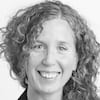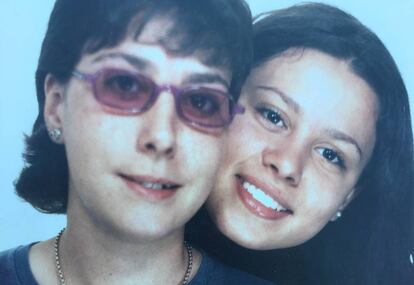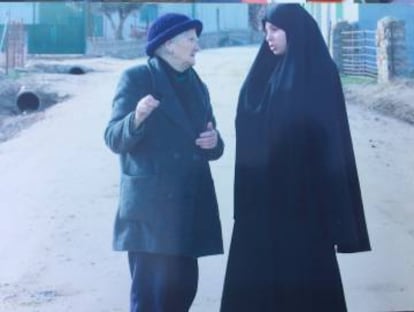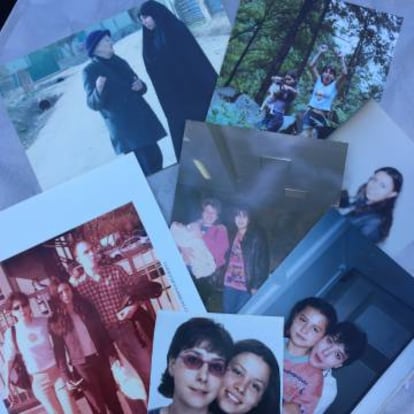“I never searched for my daughter in case they told me she was dead”
Manuela Grande, the mother of one of the Spaniards identified in Syria, tells EL PAÍS about the tough childhood of Luna Fernández and explains how the husband radicalized her


Manuela Grande (Madrid, 1974) said goodbye to her daughter Luna Fernández in the winter of 2014. “She was going, aged 25 [Fernández claims she was two years older than that] and with two children aged four and six to Alexandria [Egypt], convinced to do so by her partner, a young Moroccan who grew up in Ceuta and is called Mohamed, and whom she met shortly after turning 18, in La Ciudad de los Muchachos care home,” explains Manuela from the corner of the Madrid region that she fled to after losing her three sisters (“far too young”), and then her mother in 2016, as well as her partner of 28 years. “I was left alone in the world, my life had no meaning and I preferred not to seek out my daughter in case they told me she was dead.” Luna Fernández Grande is one of the three Spanish female jihadists that have just been identified in Syria.
The lives of Manuela and Luna had always been difficult. “She’s my only daughter, I had her when I was just 15, in 1989, she was born in [Madrid’s] La Paz hospital,” she explains. “Social Services took her from me when she was just four, because neither I nor my mother could take care of her, they were difficult times,” she says. Her biological father did not return into their lives until he found out he was a grandfather.

Luna grew up in care homes in the Madrid region. “They gave her to me at the weekends, during vacations… She was a normal girl, with her friends, with the doubts any teenager goes through – should I smoke a cigarette, should I get my nose pierced… – she was an atheist and bit by bit we became kind of sisters. [My partner] Juan was always a father to her, they had a good relationship and she adored my mother, her grandmother Claudia,” she struggles to explain. “I have spent the last two years taking three tranxilium [tranquilisers] a day, that has been the last part of my life and my memory fails me somewhat. While I liked the fact that Luna would tell me anything and had that trust in me, I always said to her, ‘Luna, don’t forget I am your mother.” Luna changed a lot before she left “to supposedly set up a clothing business in Alexandria with another couple who were friends of theirs.”
When Mohamed arrived in Luna’s life, she turned into a different person. “Reserved, fearful… They went to live in a house that was given to them by the family of Moja [Mohamed] in the gypsy town of Rivas, and she started to go to the El Carmen mosque. First she would cover her head and then her whole body in black, she depended on him financially, she told me that he sold honey,” she recalls. “I was alone with her during the births of her two first children in Madrid – I think she’s had two more over there – and she would say to me, ‘Mom, don’t look,’ as if she were ashamed, it was such a strange thing,” Manuela explains. “Moja was an incredibly quiet guy, he barely spoke, but he smoked, drank, didn’t go to the mosque. My daughter told me he didn’t talk to me because I was a woman. I didn’t like him at all. We would argue about him, but it was no use.”

Thanks to one of her friends from La Ciudad de los Muchachos, the Spanish authorities have managed to find Luna in Syria. “I grew up in a care home,” begins the letter that her friend sent to the police, the United Nations’ refugee agency UNHCR, and the Syrian Embassy. “That was where we met and we grew up together. Her name is Luna Fernández Grande. Our shared circumstances and experiences in that home turned us into sisters, but several years ago her behavior changed drastically after she paired off with a man of Moroccan origin who is currently involved in Islamic terrorist groups and is probably jailed in Syria right now, according to information from his family.
“Having always been an atheist, she suddenly turned into an Islamic fanatic, applying all of the clichés of that religion to her lifestyle. She broke off contact with her closest contacts and the last thing that was known about her via the family of her partner was that she had had two children and that the four of them were in Syria,” the letter continues.
That was the last news that Manuela had about her daughter, when, “a year after she left, in 2015,” she got a visit from the police. “They were asking about Mohamed and they told me that he was being investigated as a recruiter of fighters for the Islamic State, and they thought that she was dead. My daughter is a lovely girl, she just lost that big heart that she had,” says Manuela. “Love leaves us all blind, and I’m sure that if she could, she would have returned, but she was no doubt scared about her children. She’s a very good mother and she will always, always, always be my queen.”
English version by Simon Hunter.
Tu suscripción se está usando en otro dispositivo
¿Quieres añadir otro usuario a tu suscripción?
Si continúas leyendo en este dispositivo, no se podrá leer en el otro.
FlechaTu suscripción se está usando en otro dispositivo y solo puedes acceder a EL PAÍS desde un dispositivo a la vez.
Si quieres compartir tu cuenta, cambia tu suscripción a la modalidad Premium, así podrás añadir otro usuario. Cada uno accederá con su propia cuenta de email, lo que os permitirá personalizar vuestra experiencia en EL PAÍS.
En el caso de no saber quién está usando tu cuenta, te recomendamos cambiar tu contraseña aquí.
Si decides continuar compartiendo tu cuenta, este mensaje se mostrará en tu dispositivo y en el de la otra persona que está usando tu cuenta de forma indefinida, afectando a tu experiencia de lectura. Puedes consultar aquí los términos y condiciones de la suscripción digital.







































